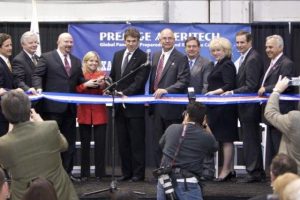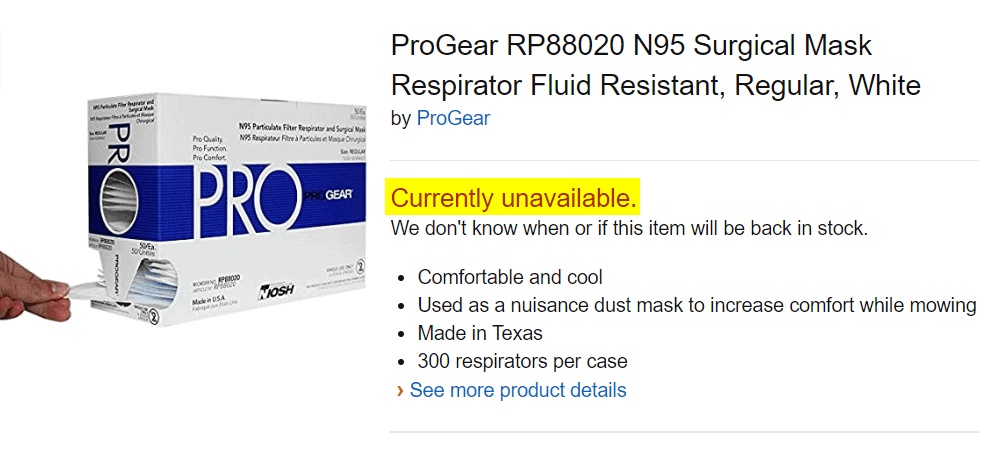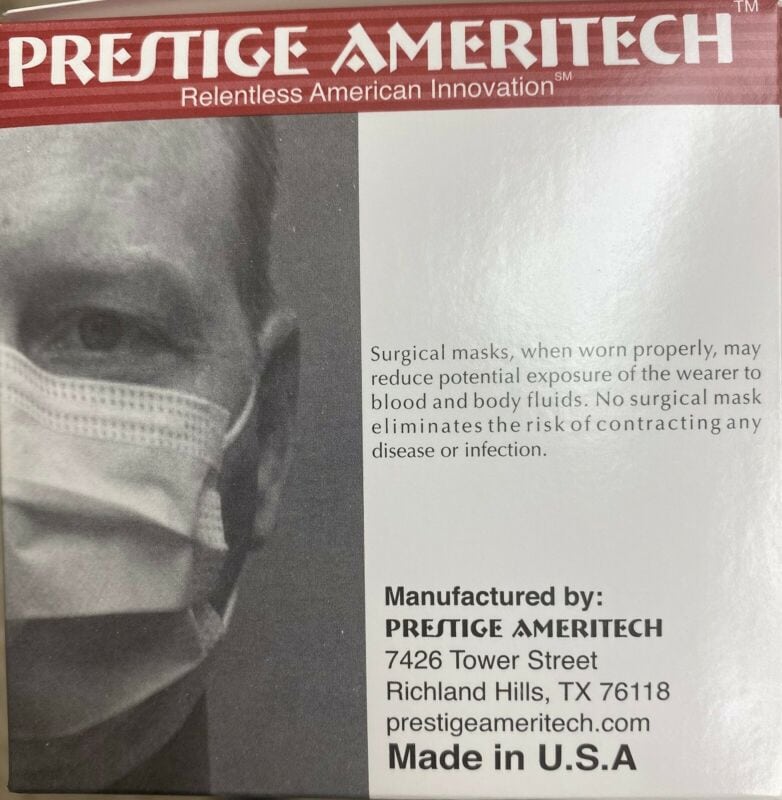In This Episode: An American company that makes masks and other PPE chose NOT to ramp up production to help with the Covid pandemic. That sounds like a decision to be criticized, but it’s actually an example of Uncommon Sense. This episode explores why.
067: Counterintuitive
Tweet
How to Subscribe and List of All Episodes
Show Notes
- Help Support Uncommon Sense — yes, $5 helps!
- There are several photos scattered through the transcript, below.
- The story of my experience with Swine Flu. “We dodged a bullet,” I said on that page: “we may not be as lucky next time.” And here we are.
- Sources for this episode include Dallas Morning News and NPR.
Transcript
Welcome to Uncommon Sense, I’m Randy Cassingham.
Last week I promised to tell you the “counter-intuitive story about why someone chose not to do something extraordinary to help with this pandemic.” It sure doesn’t sound like Uncommon Sense, but it is, and you’ll understand why after you hear the whole story.
Mike Bowen is the executive vice president of a company called Prestige Ameritech, located in North Richland Hills, Texas, a suburb of Fort Worth. The company makes surgical masks, medical gowns, face shields and goggles, and even the coveted N95 respirator masks that nearly every hospital, EMS agency, and medical research facility desperately needs more of. In fact, Prestige Ameritech is the largest manufacturer in the United States for this kind of Personal Protective Equipment, or PPE.
Why import stuff from China when it’s made right here? And lately, a lot of the N95 masks coming out of China are fake — they’re not actually made to the standards required to ensure they actually filter out the nasty stuff they’re supposed to. You’d think Prestige Ameritech would be running their 220,000 square foot factory at full capacity, running three shifts working 24×7 to make as many masks as possible to fill the shortages. But they’re not.
It’s a top-notch company: they’re ISO 13485 Certified, which means they’ve passed the requirements laid out by the International Organization for Standardization for a comprehensive quality management system for the design and manufacture of medical devices. They’re FDA Registered, which means they passed various inspections by the U.S. Food and Drug Administration to assure their compliance with the FDA’s requirements before it could be listed as a registered facility.
 They’ve also been recognized by the Historically Underutilized Business Zones (or “HUBZone”) program, which was established by the U.S. Small Business Administration to promote American-owned small businesses by providing incentives for the federal government to do contracting with them because they operate and create jobs in communities with proven economic needs. Heck, they’re even certified as a Native American Owned Business by the Cherokee Nation Tribal Employment Rights Office.
They’ve also been recognized by the Historically Underutilized Business Zones (or “HUBZone”) program, which was established by the U.S. Small Business Administration to promote American-owned small businesses by providing incentives for the federal government to do contracting with them because they operate and create jobs in communities with proven economic needs. Heck, they’re even certified as a Native American Owned Business by the Cherokee Nation Tribal Employment Rights Office.
With the Covid crisis in full swing and PPE in critically short supply, “There is 200 times more demand than there is supply,” says the company’s Executive VP, Mike Bowen. “My phone is ringing every two minutes. Every one minute I am getting an email.” So why is his company only running their regular weekday manufacturing shifts, closing nights and weekends, rather than going all out to make this much-sought-after PPE?
“I’ve been preaching this American-made story since 2007,” Bowen says. “Nobody listened. The whole mass market was only interested in price. I’ve been everywhere trying to get people to listen. I’ve talked to congressmen. I’ve talked to generals. I’ve written the president. I wrote President Obama five or six letters.”
And?
“And he sent me a presidential proclamation suitable for framing.”
What Bowen’s company didn’t get was contracts from American governments, or hospitals, or medical supply companies for his masks and other PPE.
In 2005, “the surgical mask supply went from being 90 percent U.S.-made to being 95 percent foreign-made” he said — “in literally one year.” That’s actually the year Prestige Ameritech started business: former industry leader Kimberly-Clark had a factory in Texas, but they moved their production to Mexico, where labor was cheaper. Their abandoned factory is where Prestige Ameritech set up their business.

In 2009, there was a pandemic: Swine Flu, which was an H1N1 flu virus that swept around the world, starting in Veracruz, Mexico, in January 2009. By August 2010 there were 1.6 million confirmed cases, plus untold unreported cases (including mine, by the way). The CDC estimated 284,000 deaths from that one, and other death estimates ranged as high as 575,400 people. That’s a lot better than the previous H1N1 pandemic: that was 1918, when around 100 million people died.
There was a huge demand for masks for the 2009 Swine Flu, too, and Prestige Ameritech geared up for it, buying new machines and hiring scores of people to run three shifts to make masks 24×7. But once all the various companies making such masks caught up with the demand and filled the pipeline again, orders stopped. Sure, everyone was happy that Prestige Ameritech supplied N95 masks for a reasonable cost — currently, in Texas another company is selling them for more than $6 each …for anyone willing to buy 1 million masks, and pay cash up front. Otherwise, they’re more. And that was in late March. I’ll bet the price is higher than that now!
Hospitals and such that bought masks from Prestige Ameritech during the Swine Flu pandemic promised they would continue buying from them after the pandemic. But they didn’t. And here the company had three shifts of workers to keep busy to work the new million-dollar machines they bought to increase their capacity. But the workers and machines were anything but busy. The company had to lay off 150 employees to survive: “150 people that saved a lot of hospitals from closing their doors were rewarded by losing their jobs,” Bowen said later. The sudden drop in sales almost bankrupted the company: they were saved only by a last-minute million-dollar loan. Bowen looked back at those stressful times and vowed: “That’s not going to happen again.”
He pays reasonable wages for American workers to make a high quality product; the average mask the company makes costs around 10 cents. But when times are good, hospitals are lured back to Chinese factories that pay employees a fraction of what American workers get, and even with shipping their masks across the ocean, they only cost an average of about 2 cents each.
“Imagine if, all at once, millions of people wanted to skateboard,” Bowen said. “The skateboarding industry is not set up for spikes like that, and neither is the mask-making industry.”
So now, Bowen is happy to supply his actual long-term customers, the ones willing to pay a little more for high-quality American-made masks. But those coming to him in a panic are sent away unless they’re willing to sign a long-term contract to keep buying his masks after all this is over. But few will, knowing that when this is all over, the Chinese masks will be 2 cents again, not multiple dollars.
The company did gear up for their regular customers, and are turning out about a million masks a day, four times their usual rate. But get this: in early March, Bowen said he had turned away orders for 1.5 billion masks. Because he knows what happens later. “One day — and it is literally almost like one day — it just quits,” he said. “The demand is over, the phones stop ringing.”
And it wasn’t just that the hospitals and such didn’t need as many masks when infections slowed to a crawl: there were so many orders already in the pipeline that they all ended up with a huge surplus, and didn’t buy any more masks for months. It’s hard to go from full-out manufacturing to stopping essentially overnight. So he’s not going to let that happen again.

“What weighs on me personally,” Bowen said, “is getting an email from a mother who has a child with Down syndrome and is immunocompromised and wants to buy masks directly from us, or from a person who is 80 years old and worried about getting coronavirus. You just see the fear in these emails, and I’m getting lots and lots and lots of [them].” But, says Bowen, they have a limit to what they can do, and what they’re doing is supporting the buyers who have committed to buying from them long-term, so they can stay in business. “We can’t help everybody,” he said.
A few years ago, Oscar Trevino, the mayor of North Richland Hills where the company is headquartered, took Bowen to the state capitol in Austin to urge state politicians and bureaucrats to support the local company paying taxes — and paying good wages to employees who pay taxes. The city wrote letters on the company’s behalf to federal bureaucrats.
“He was begging them to understand that we shouldn’t have all our masks made in China,” Mayor Trevino said. “He wanted a federal government contract that would keep him in steady business,” and build a stockpile of masks for the next pandemic Bowen knew would come along. “If y’all don’t care about me in good times when everybody’s OK,” Bowen told lawmakers, “how am I going to be there when you need me?”
“Everything he was saying fell on deaf ears,” Trevino said.
“If the government doesn’t even buy American,” Bowen said, “who will?”
In March, U.S. Sen. Marco Rubio of Florida named Prestige Ameritech the “Senate Small Business of the Week.” That didn’t come with a long-term contract to buy their masks: all the company got was yet another empty proclamation to stick on the wall.
It is irrational and contrary to our national security to depend on other countries for critical items to respond to predictable crises such as pandemics. We saw significant PPE shortages in the 2009 Swine Flu, and now a there’s critical shortage — with countless front-line medical personnel dying — in the Covid crisis.

So it’s not just rational for Bowen to refuse to gear up and hire a bunch of people to churn out 10-cent masks only to shunned later when the emergency is over. It’s Uncommon Sense borne of a painful lesson of how prior pandemics went. The way to make change happen for the long term clearly depends on not bailing out America from its lack of planning — again.
Do you think the politicians and bureaucrats — and hospitals — will learn this time? I sure hope so, but I won’t hold my breath — and clearly Mr. Bowen won’t either. He did, at least, make the necessary and difficult decision to make sure that his company will be around for the next pandemic — and there definitely will be one. The thinking behind his decision seems counter-intuitive, but it isn’t: that’s often the nature of Uncommon Sense.
The Show Notes for this episode are at thisistrue.com/podcast67, which has links to some of my sources, photos, a way to support the podcast, and a place to comment.
I’m Randy Cassingham … and I’ll talk at you later.
Updates
The New York Times reported in March 2022 that after a big surge in demand for American-made masks, there was a big upswing in start-up PPE manufacturers in the U.S. But, “Today, the small U.S. mask manufacturers are in dire straits, if they haven’t gone out of business already.”
But in January 2023, Reuters reported that “Burned by COVID supply crunch, hospitals invest in U.S. mask-making” — including Prestige Ameritech. So theoretically, they will see more sustained demand, which “should” keep them in business.
– – –
Bad link? Broken image? Other problem on this page? Use the Help button lower right, and thanks.
This page is an example of my style of “Thought-Provoking Entertainment”. This is True is an email newsletter that uses “weird news” as a vehicle to explore the human condition in an entertaining way. If that sounds good, click here to open a subscribe form.
To really support This is True, you’re invited to sign up for a subscription to the much-expanded “Premium” edition:
Q: Why would I want to pay more than the minimum rate?
A: To support the publication to help it thrive and stay online: this kind of support means less future need for price increases (and smaller increases when they do happen), which enables more people to upgrade. This option was requested by existing Premium subscribers.

Hopefully every nation will build up a production, emergency supply and distribution system for all essential consumable medical supplies with stocks for 2-3 months of peak demand. The system would need be THE SUPPLIER for the medical community. Selling “old” stock would allow new stock to be brought in and generate the revenue needed to pay for the system. I think that this would be workable with centralized health care systems (U.K) and semi-centralized systems (Canada) but the U.S. would require an act of Congress (and good luck with that). I originally thought of regional system like NAFTA or EU but as the 3M/Trump spat showed, even your closest ally can’t be trusted, so individual nations it is. Final thought: developed countries like Canada could work with NGO’s to do the same for less developed economies and refugee camps.
I entirely understand the company’s attitude.
It’s a similar situation in the UK, where most of the PPE seems to be made overseas. And where local companies have offered to retool and help by switching to manufacturing PPE instead of, say, raincoats, the National Health Service big wigs (in England called Public Health England) are ignoring them. And they have been ignoring universities and other private laboratories who are begging to help with testing for Coronavirus.
Here we are often told that the National Health Service is the “Envy Of The World”, but though the front line staff are desperately doing their best often at great personal risk, the managers shouldn’t be trusted to “run a whelk stall”/”organise ap?ss-up in a brewery”/ “get l#?d in a knocking shop” — Insert your own expression.
Curiosity makes me ask — How did you ever hear about this company?
A smaller-size, Native American owned, HUB Zone medical supply manufacturing business… reached the attention of a Colorado “blogger” who is an EMT in his real life. (It felt so wrong to describe you as a blogger just now.) Did your agency/company/county get a decline letter from him?
—
Heh! Yeah, I prefer “social commentator” (who uses “weird news” as his vehicle). As such, I skim through a lot of news stories, and happened to see the Dallas Morning News article (linked above as a source). It really struck me that it was totally appropriate as a “counterintuitive” example of Uncommon Sense — so much so that the word ended up being the natural title. EMT is just a volunteer sideline in my rural community. -rc
Your production is also “Made in America” and well worth the extra cost of a monthly subscription which I gladly make to support your efforts.
The actions of Prestige Ameritech are well worth reading. But we all know that what he is doing is exactly the right thing to do. We can just hope that whoever the Federal employee is who buys to stock up the National Stockpile of pandemic gear is also a True subscriber and will act accordingly. Hmmm. Unlikely, huh?
—
I do have some federal employees as subscribers, but the odds of THAT one being a subscriber? Pretty low. But we can hope. And thanks for your support for TRUE! -rc
For a number of years now I’ve been a Cassandra about China: that a war with them was coming (my best guess was ca. 2050) that we can’t win. We won WWII by the sheer force of our vast manufacturing capability, and the ability to turn on a dime to create, quickly, what was needed to defeat the Axis nations. But as our manufacturing people and real estate were exported to China, India, Bangladesh, etc. we are no longer able to do these seemingly miraculous feats, and are extremely vulnerable to losing the next armed conflict.
—
Maybe this emergency will be the turning point we needed to wake ourselves up. We’ll see if our so-called leaders have the fortitude to do it. -rc
I have mixed feelings here.
I can appreciate the business accumein and experience guiding his hand for the long run.
But there’s also the potential to make more money in the short time because of being uniquely prepared: Could he address markets he’s never had a chance at because of sudden new market demand? While yes, it is known the new demand will fall away, can additional sales be made without jeapordizing the core business? As it is known the business will fall away, long-term capital investments (new machinery) gets ruled out. Maybe the workers would have been open to working overtime, or even he could have pickup up temporary workers for additional shifts during the need with the understanding that this is temporary? Overtime has lower personell costs even as the overtime pay rate is higher: win/win for employer and employee.
Yes, an overproduction would put merchandise on the shelf and thwart future purchases, yet these are consumables, and the consumption rate is currently high. This is where an entrepreneur would review the current info and try to predict a business model for optimizing profit, while likewise dropping the enhanced production when indicators show the supply will start overrunning demand. Plus, as others have tooled up, there will be an oversupply of ‘other brands’ once the need subsides, so ‘doing nothing extra’ doesn’t address that either.
And run a branding campaign so that when the customers are left with the choice of foreign vs. ‘their brand’, the users’ memories may help steer future purchasing choices.
But I can type all I want: they’re the people ‘doing’, and I defer to them.
—
As noted, they already quadrupled output, which involved hiring (perhaps also overtime), to accommodate new contracts. That’s a huge increase. Should they tire out their workers and risk running out of raw materials for a short term gain, thus damaging their long-term clients? Doesn’t sound like a good idea to me — yet that’s what most American businesses do, and part of why at least half of American businesses fail within their first five years. -rc
Echoing a prior comment, with the following stipulations:
1) Provided his facility and equipment had the excess capacity
2) Raw materials were available
3) Training of new people wouldn’t jeopardize existing employees
Then, with so many people out of work, I see no harm in fulfilling some of these orders. To me this is no different than all the retail establishments and shippers hiring temps during the interval of Black Friday to New Years.